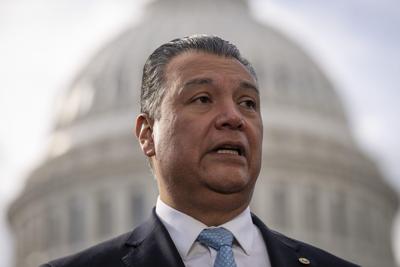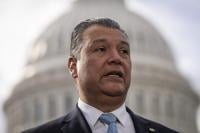
(Drew Angerer/Getty Images)
As the U.S. Senate considers a proposal that could cut billions from Medicaid, a coalition of California leaders gathered on Friday, June 27, for an online town hall to raise an urgent alarm. The event, hosted by the “Fight for Our Health” coalition, brought together Sen. Alex Padilla (D-CA), health professionals, public officials and labor advocates who made it clear that these proposed cuts would devastate the most vulnerable, especially in Latino, rural and disabled communities.
The stakes are exceptionally high for California, where millions of people rely on Medi-Cal for their basic health needs. Among those affected would be a significant portion of the Latino population, who already face health challenges and barriers to care.
According to the U.S. Department of Health and Human Services Office of Minority Health, “in 2020, Hispanic adults were 60% more likely than non-Hispanic white adults to be diagnosed with diabetes by a physician,” and “more than twice as likely to be hospitalized for treatment of end-stage renal disease related to diabetes.”
“These changes would potentially cut tens of billions of dollars a year in funding for Medicaid here in California,” said Amanda McAllister-Wallner, executive director of Health Access California. She warned that “there is no way for the state to absorb these cuts. It will inevitably lead to people losing care and likely to cuts in services, and as we've heard about, hospitals and clinics potentially having to close their doors or reduce their services for the communities.”
She also explained that the federal government penalizes states like California by reducing the federal match for Medicaid, even when those states use their own funds to provide coverage for immigrants, both undocumented and lawfully present. This policy, she noted, affects over a dozen states and effectively punishes efforts to expand healthcare access by diminishing the federal support available through the Affordable Care Act’s Medicaid expansion.
“A Big Bill for Billionaires”
U.S. Senator Alex Padilla (D-CA) didn’t hold back in his condemnation of the bill: “This is a big bill for billionaires,” he said. “Some Republicans might say: ‘We have to do this because the federal budget is too big. We have to tackle the nation's debt.’ But that's not what's happening here. It's important to ask ourselves, why? How can a budget that will cut so much actually increase the debt? It's because their reason for cutting, cutting, cutting is to underwrite yet more tax breaks for billionaires and the largest corporations.”
Building on that idea, Sen. Padilla warned that the proposal’s real-world consequences would be felt acutely in his home state. He projected that 15 million Californians—including five million children—could lose health-care coverage if the bill becomes law.
“It's safe to say [that] we're at a critical moment for our country, and [it] just reflects on what's been transpiring over the last several months in their efforts to help the wealthiest families in America. They have made life harder for working families around the country,” he said, arguing that the legislation sacrifices the well-being of everyday people to enrich a privileged few.
With those stakes in mind, Padilla ended on an urgent note of solidarity and resistance. “Let's continue to organize and continue to push back.”
Doctors on the frontlines
Dr. Jasmeet Bains, California State Assemblymember (AD-35) and executive director of Health Access California, brought a deeply personal perspective. “In my community, a lot of the rhetoric that's being said is: ‘Oh, no, their health care won't be touched. No, the Republicans actually saved health care. We created the solvency for a crumbling health care system,’” she said. “No, do not sit there and tell a doctor that works in a clinic in her hometown of Delano, across the street from the preschool that she grew up in, […] [who works] as a physician, seeing patients that I don't know what I'm talking about […] It is as bad as it looks. This is not propaganda.”
She explained how the proposed cuts would devastate rural communities like her own, where Medi-Cal is a lifeline for both patients and healthcare providers. “My patients depend on Medi-Cal to keep our local clinic and hospital doors open,” she said, emphasizing that seniors and people with disabilities rely on it for essential, everyday needs like the ability to shower and eat dinner at home.
She criticized Republican lawmakers for labeling such basic support as a “wasteful luxury,” blaming them for pushing policies that would shutter rural hospitals, eliminate thousands of healthcare jobs, and strip vital services from vulnerable seniors—all to fund tax breaks for billionaires.
“Their cruelty will kill some of my patients,” she said categorically.
Dr. Shannon Udovic-Constant, president of the California Medical Association, emphasized the potentially devastating effects of the cuts on children: “In California, half, I'll say that again, half of all children born in the state are on Medi-Cal, ensuring that from birth they have access to life-saving health care, both regular and routine visits.”
When access to healthcare is taken away, the consequences can become life-threatening, she explained. Without coverage, families are forced to delay care until it becomes an emergency, leading to worsening illnesses that could have been easily treated during a routine checkup. This not only puts children at serious risk but also drives up healthcare costs and strains emergency departments, creating delays that affect every patient in the community.
Community clinics at risk
The chief executive officer of St. John’s Community Health in Los Angeles, Jim Mangia, warned that the proposal, framed as a push for efficiencies and work requirements, would in reality burden the healthcare system with excessive “bureaucratic paperwork and restrictions.”
For him, these changes would result in millions of Californians losing their health care coverage. Among those most affected would be the state's uninsured population, who would no longer be able to receive care at community health centers or see a doctor, thereby deepening health disparities and straining already vulnerable communities.
A concern shared by Judy Mark, co-founder and President of Disability Voices United, “People with disabilities will die if these Medicaid cuts go through. It's that simple […] [they] aren't fighting for Medicaid funding so that they can live a life of luxury. They aren't sailing on Mediterranean yachts this week or hosting a $50 million wedding in Venice, like some billionaires are,” she said. “This Medicaid funding goes to basic and essential services that are life-supporting and life-saving […] like wheelchairs, feeding tubes and home health care staff who could help people with disabilities live safely in their homes instead of being warehoused in ridiculously expensive and tragically decrepit institutions.”
Latino leaders and advocates have made clear that the proposed cuts would have a disproportionate impact on their communities. With over half of California’s Medi-Cal recipients identifying as Latino, and with higher rates of chronic conditionslike diabetes, losing access to care could mean the difference between life and death.
As Arnulfo De La Cruz, president of SEIU Local 2015, stated: “It's shameful that [U.S. Representatives] Young Kim and David Valadao listen to billionaires, big corporations, and Republican leaders, but would not even give caregivers, or people with disabilities, seniors, children and working families in their district and audience. […] Caregivers are also getting ready for November 2026, and this issue will be front and center on the minds of millions of voters.”







(0) comments
Welcome to the discussion.
Log In
Keep it Clean. Please avoid obscene, vulgar, lewd, racist or sexually-oriented language.
PLEASE TURN OFF YOUR CAPS LOCK.
Don't Threaten. Threats of harming another person will not be tolerated.
Be Truthful. Don't knowingly lie about anyone or anything.
Be Nice. No racism, sexism or any sort of -ism that is degrading to another person.
Be Proactive. Use the 'Report' link on each comment to let us know of abusive posts.
Share with Us. We'd love to hear eyewitness accounts, the history behind an article.